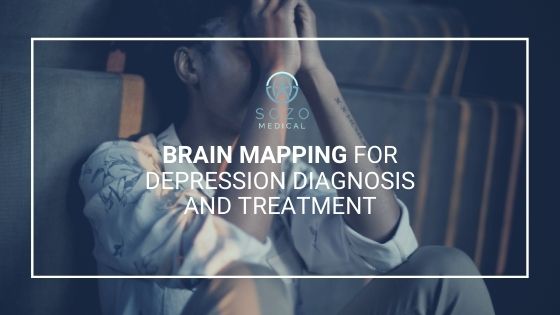Article Contents
Treatments for depression and other mental health conditions have evolved greatly over the years. Thanks to innovative technologies, psychiatrists are now able to better diagnose and treat conditions by looking at the brain and how it responds to external stimuli. By using brain mapping, patients can learn to self regulate their emotions, thereby reducing symptoms of depression and the impacts depression has on their lives.
Mental health disorders like depression are sometimes difficult to properly diagnose. Oftentimes, individuals suffering from depression have co-occurring disorders that are impossible to recognize due to an overlapping of symptoms. For example, individuals suffering from post-traumatic stress disorder (PTSD) may also be depressed – but their depressive symptoms may be misdiagnosed as symptoms of their PTSD. As a result, medical professionals have begun utilizing brain mapping as a diagnostic technique for conditions such as depression.
To explain, brain mapping is a fairly new and convenient way for doctors to identify conditions such as depression. Non-invasive and extremely effective, brain mapping has begun to revolutionize the diagnosis and treatment of depression. By definition, brain mapping is the study of the anatomy and function in the brain and spinal cord through the use of imaging, immunohistochemistry, molecular & optogenetics, stem cell and cellular biology, engineering, neurophysiology, and nanotechnology. In other words, brain mapping identifies inconsistencies in the brain that indicate a mental health condition. As a result, medical professionals can properly diagnose and treat depression through the use of brain mapping.
What is Depression?
Depression is a mood disorder that affects the way an individual thinks, feels, and behaves. This illness causes feelings of sadness or hopelessness that may last from a few days to a few years. Some individuals experience depression once in their lifetime, while others suffer from chronic episodes of depression. This more serious, chronic form of depression is known as major depressive disorder (MDD). MDD may also be referred to as clinical depression or major depression.
The symptoms of MDD significantly impair an individual’s ability to function. This includes interfering with daily activities such as school, work, and social events. Also, symptoms of depression affect mood and behavior as well as various physical functions, such as sleep and appetite. In order to be diagnosed with MDD, you must display five or more of the following symptoms at least once a day over two weeks:
- persistent feelings of sadness and hopelessness
- lack of interest in doing most activities, including those you once enjoyed
- decrease or increase in appetite accompanied by extreme weight loss or weight gain
- sleeping too much or too little
- restlessness
- fatigue
- excessive or inappropriate feelings of guilt or worthlessness
- difficulty making decisions, thinking and concentrating
- multiple thoughts of death or suicide
- a suicide attempt
According to the Depression and Bipolar Support Alliance, 14.8 million American adults, or 6.7 percent of the United States population over age 18, are affected by depression yearly. If you or a loved one suffer from this condition, you may want to consider trying this technique.
What is Brain Mapping and Neurofeedback for Depression?
Neurofeedback for depression is the process of treating areas of the brain that display as imbalanced or compromised. In addition to depression, neurofeedback helps treat an array of issues such as ADHD, sleep, anxiety, and learning challenges. Brain mapping, or EEG brain mapping (qEEG), allows doctors to administer neurofeedback for depression in an effective way. To explain, brain mapping is an innovative tool that can be used to identify problematic areas of the brain that indicate depression. Brain mapping allows doctors to identify and treat areas of the brain affected by depression.
Once brain mapping techniques have indicated signs of depression, doctors will begin administering Neurotherapy. Simply put, Neurofeedback is biofeedback for the brain, as it is also referred to as EEG biofeedback. Neurofeedback for depression regulates and stabilizes imbalances in a patient’s brain without the use of medication. In other words, neurofeedback is a state-of-the-art, non-invasive treatment that helps to treat symptoms of depression by shifting the production and distribution of the brain’s electrical energy.
How Brain Mapping Works to Identify and Treat Depression
There are five frequency bands of natural electrical energy produced by the brain, known as Delta, Theta, Alpha, Beta, and Gamma. These frequency bands allow doctors to identify which areas of the brain are active and functioning effectively. When one of these frequency bands is firing off energy at an inappropriate time, this means the individual is suffering from depression. In other words, doctors will look for imbalanced bands of electrical energy. Once problem areas are identified, physicians can utilize neurofeedback to treat symptoms of depression in the brain.
It is important to note that brain mapping is typically not a stand-alone treatment. While attending brain mapping and Neurotherapy for depression, patients should receive additional forms of therapy and medication when needed. When brain mapping, neurofeedback, and additional forms of treatment are utilized, individuals are able to make a full recovery from depression. If you or a loved one suffer from symptoms of depression, our experts can help you recover.
Get Started With Brain Mapping in Fort Lauderdale
Brain mapping is an effective form of treatment for depression utilized across the United States. To explain, brain mapping allows doctors to identify imbalances in the brain resulting from depression. As a result, physicians are able to properly diagnose and treat depression.
“Sozo Medical Group is dedicated to helping individuals get back to a healthy and happy place by using innovative therapy methods. Our vision is to create a novel yet empowering therapy program that improves the overall wellness of individuals. We can advance the behavioral healthcare revolution providing wellness therapies nationally.”
If you or a loved one suffer from depression, contact us today to learn more about brain mapping.

All of the information on this page has been reviewed and verified by a certified addiction professional.

